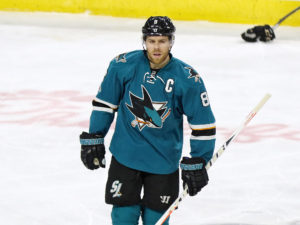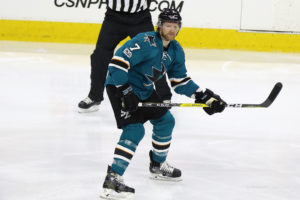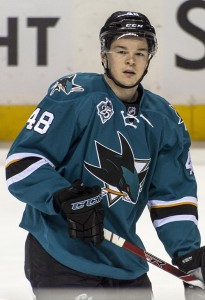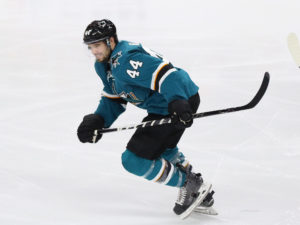In the less than classic movie Disclosure (or Michael Crichton’s even less classic book version), a line runs through the story about a corrupt business: “Solve the problem.” There are numerous problems in the operation and the drama surrounds the question “which problem needed solving?” Alas (spoiler alert), solving the most basic of these problems is the key to solving all the problems.
Such is the case with the San Jose Sharks.
There are a lot of Sharks problems coinciding with their now six-game losing streak. But if they solve the basic problem, everything else will fall into place.
A Slide in the Standings

The Sharks, once seemingly a lock to win the Pacific Division, have fallen out of first, and may fall out of second and third before long.
But the problem is not with the standings. San Jose will make the playoffs. The Sharks are two points away from clinching a playoff berth. These two points can come from any combination of Los Angeles Kings losses and Sharks non-losses. Anytime either team takes the ice, the Sharks can clinch a playoff berth.
Winning The Pacific Division
It is refreshing to hear players from the Anaheim Ducks talk about the importance of winning the Pacific Division. Or more accurately, the lack of importance. Nate Thompson was positively ambivalent, “Wherever we end up in the standings, it is what it is.” Corey Perry was even more blunt, “It doesn’t matter. It hasn’t mattered the last four years. Whatever happens, happens.”
In the NHL, winning a division tells you nothing about your team’s chances in the playoffs. The Ducks understand this. For Anaheim, the regular season is no longer about points, it is about playing better hockey.
Follow The Puck
A single play illustrates the sorts of mistakes San Jose has made in this recent run. We’ll look at a Nashville goal, the opening score in the Sharks’ recent loss. We’ll look at it a few times, each time focusing on a different aspect. The goal/replays are from 10 seconds to 30 seconds on the video.
Nashville’s Craig Smith (15) wins a puck battle as the Sharks’ Tomas Hertl (48) stumbles behind the net, effectively creating a 3-on-2 for Nashville. To help Hertl, defenseman Paul Martin (7) slides down below the goal line. But Smith gets rid of the puck a split second before Martin gets there. The puck comes out front. Brent Burns (88) attempts to swat it out of mid-air but misses. Instead, Colin Wilson (33) collects the puck.
With both Hertl and Martin below the goal line, the 3-on-2 has become a 2-on-1 above the goal line. Burns’ momentum moves him away from the net front area and he quickly pressures Wilson. But Nashville catches a break when the puck settles quickly for Wilson. He sends a crafty pass to Colton Sissons (10), alone at the front of the net. The 3-on-2 turned 2-on-1 is now the equivalent of a breakaway. Sissons has time to make a move before shooting. The puck slips past goalie Martin Jones for the score.
Follow the Players
Watch the play again, this time looking at Sharks wingers Mikkel Boedker (89) and Joonas Donskoi (27). Neither collapses enough to help out. Boedker thinks about it; he even gets close to the eventual goal scorer, but then backs out. This allows Sissons an uncontested skate to the prime scoring area.
Donskoi also errors, though it isn’t as obvious or egregious. He hesitates, then incorrectly anticipates the puck going wide. But the puck doesn’t go wide, as Wilson corrals it. The miscalculation leaves Donskoi unable to play either the puck or the player. As the pass leaves Wilson’s stick, one can see Donskoi vainly trying to block the pass.

Next up, watch Paul Martin. His initial play below the net to pick-up Smith is a reasonable decision, though it does not work. While what happens next doesn’t factor into the goal, it does deserve a look. After the play below the net, Smith easily slips inside Martin and skates, uncontested, to the front of the net. At the moment Wilson is releasing the pass (at the 15-second mark on the video), both Sissons and Smith are inside the Sharks defenders at the front of the net. Neither player was touched on their way there.
Finally, watch Hertl after he loses the puck battle below the net. Hertl does not move quickly enough or aggressively enough to fill the hole Burns left at the front of the net. Coaches talk about players moving in hard, straight lines. Hertl doesn’t do either. He weaves a bit and doesn’t skate particularly hard. This leaves Sissons the extra time to collect the puck and make a move before taking the shot.
Coach Speak
The closer an offensive player gets to the goal area, the bigger the threat. This is why coaches talk about defenders keeping play ‘to the outside’, or further away from the goal area. Defenders are supposed to get inside position (in between the offensive player and the goal area). Donskoi anticipates the puck going to the outside but Wilson keeps the puck inside. Donskoi’s default in this situation is to protect the inside, but he doesn’t. The result is an uncontested pass from Wilson to the front of the net.
Sissons easily cruises to the front of the net when Boedker decides to stay outside instead of trying to get inside and defend the net front. And while it didn’t directly impact the result, Smith got inside position on Paul Martin to reach the net front.

Hertl tried to get inside on Sissons, but not hard enough. He was late because he didn’t take a straight line or move with the urgency the situation required.
Coaches also talk about how players going to the net front area “need to pay a price.” These two links of Joe Pavelski against Nashville from last season are examples of “paying the price”. He gets hit by two skaters on the way to the crease in the first link, and gets hit multiple times just outside the crease in the other.
Two Predators made it to the front of the net untouched. The video shows how this happened, but the Sharks coaches need to know why it happened to solve the problem.
So Many Problems?

The Sharks do have a series of problems. Marc-Edouard Vlasic and Chris Tierney, missed time with the flu. It is possible they, and others are playing while not fully healthy.
After being a dominant player for the first 60 games, Brent Burns has hit a cold spell. With limited contributions from Burns, the Sharks offense has been hard to find.
The Sharks power play, a force in most seasons, has been dreadful this one. In each of the last two games, the power play scored a goal but also gave up a goal. The five players on the Sharks top power play unit have scored over 1,500 career goals. These guys know how to score, but they aren’t.
Back to Basics
The Sharks have many problems, but only one problem is critical. Solving it is straightforward. It is playing fundamentally sound hockey, nothing more. I covered one play in detail. Coaches talk about the details of the game. Hertl lost a puck battle, but the resulting cascade of mistakes led to multiple opponents open in front of the net. These mistakes are the real story. The Sharks players have not made these sorts of mistakes most of the season. In recent games, they have.
The talent is there, but the physical and mental efforts are falling short. These players know how to play better hockey, they did for most of the season. Solving the problem is simple – play better hockey.